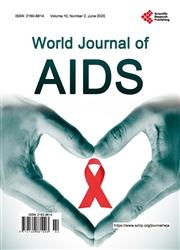Assessment of Satisfaction with Life among Elderly Patients Receiving HIV Care and Treatment in Mulago HIV Clinic: A Chronic Illness Quality of Life Model
引用次数: 0
Abstract
Objective: This study aimed at assessing satisfaction with life among elderly HIV patients attending Mulago HIV Clinic. Methodology: A cross-sectional study design carried out among elderly people (>50 years old) attending Mulago HIV clinic, as stated by the WHO standard age cut-off of >50 years. A random selection of 353 elderly HIV patients was made. The study collected quantitative data to assess patient satisfaction with life, Illness related to discrimination, Barriers to healthcare and social services, and Physical wellbeing, social support and coping using quantitative data collection techniques. Interview discussions were harnessed to obtain patients’ opinions and perceptions and then results grouped into themes. EPIDATA and STATA 14.2 statistical softwares were used for statistical analysis. Results: The study showed that only variables that were significantly associated at multivariate level are, disagreeing that other patients are seen before you when you are first to arrive, which had an odds ratio of 2.87, disagreeing that your employer can never promote you which had an odds ratio of 6.87 compared to agreeing, not being sure whether friend or family member cannot share room/uten-sil/clothes with you reduced the odds of being satisfied by 95% when compared to agreeing and disagreeing that friend or nician and give them priority, provide more work-related support awareness programs; Put more efforts towards counselling care takers or family members who help them to adhere or socialize with them.穆拉戈HIV诊所接受HIV护理和治疗的老年患者生活满意度评估:一个慢性病生活质量模型
目的:探讨穆拉戈艾滋病诊所老年艾滋病患者的生活满意度。方法:采用横断面研究设计,在Mulago HIV诊所就诊的老年人(50岁至50岁)中进行,WHO标准年龄限制为50岁至50岁。随机抽取了353名老年艾滋病患者。该研究收集了定量数据,利用定量数据收集技术评估患者对生活的满意度、与歧视有关的疾病、获得医疗保健和社会服务的障碍、身体健康、社会支持和应对。访谈讨论被用来获得患者的意见和看法,然后将结果分组到主题中。采用EPIDATA和STATA 14.2统计软件进行统计分析。结果:研究表明,在多变量水平上,只有不同意其他病人在你第一次到达时比你先看到,这是2.87的比值比,不同意你的雇主永远不会提升你,这是6.87的比值比,而同意,不确定朋友或家人是否不能与你共用房间/餐具/衣服,与同意或不同意朋友或家人并优先考虑他们,提供更多与工作有关的支持意识项目相比,满意度降低了95%;把更多的精力放在辅导照顾者或帮助他们坚持或与他们交往的家庭成员上。
本文章由计算机程序翻译,如有差异,请以英文原文为准。
求助全文
约1分钟内获得全文
求助全文

 求助内容:
求助内容: 应助结果提醒方式:
应助结果提醒方式:


